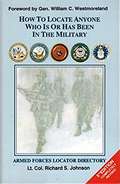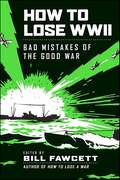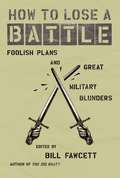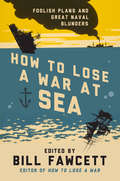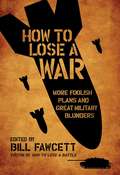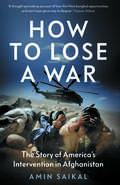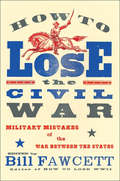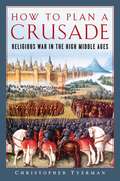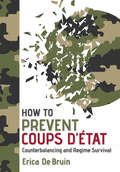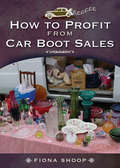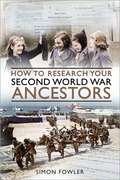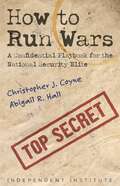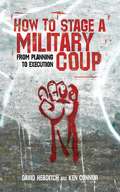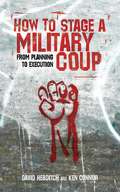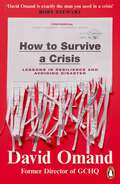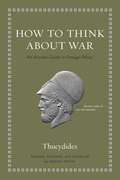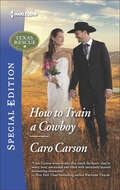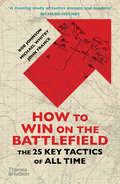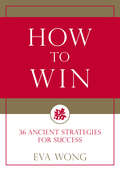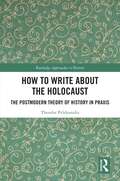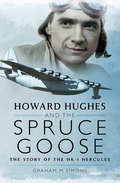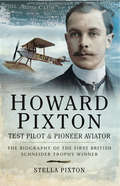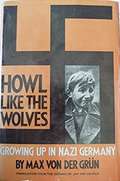- Table View
- List View
How to Locate Anyone Who Is or Has Been in the Military: Armed Forces Locator Directory
by Richard JohnsonBy the foremost expert in the nation on locating people with a military connection.
How to Lose WWII: Bad Mistakes of the Good War (How to Lose Series)
by Bill FawcettHow to Lose WWII is an engrossing, fact-filled collection from Bill Fawcett that sheds light on the biggest, and dumbest, screw-ups of the Great War. In the vein of his other phenomenal compendiums of amazing battlefield blunders, How to Lose a Battle and How to Lose a War, Fawcett focuses on some amazing catastrophic missteps of Axis and Allies alike.
How to Lose a Battle: Foolish Plans and Great Military Blunders
by Bill FawcettA remarkable compendium of the worst military decisions and the men who made them. The annals of history are littered with horribly bad military leaders. These combat incompetents found amazing ways to ensure their army's defeat. Whether it was a lack of proper planning, miscalculation, ego, bad luck, or just plain stupidity, certain wartime stratagems should never have left the drawing board. Written with wit, intelligence, and eminent readability, How to Lose a Battle pays dubious homage to these momentous and bloody blunders, including: Cannae, 216 B.C.: the bumbling Romans lose 80,000 troops to Hannibal's forces. The Second Crusade: an entire Christian army is slaughtered when it stops for a drink of water. The Battle of Britain: Hitler's dreaded Luftwaffe blows it big-time. Pearl Harbor: more than one warning of the impending attack is there, but nobody listens. How to Lose a Battle includes more than thirty-five chapters worth of astonishing (and avoidable) disasters, both infamous and obscure -- a treasure trove of trivia, history, and jaw-dropping facts about the most costly military missteps ever taken.
How to Lose a War at Sea
by Bill FawcettAn engrossing compendium of high-seas military disasters From the days of the Spanish Armada to the modern age of aircraft carriers, battles have been bungled just as badly on water as they have been on land. Some blunders were the result of insufficient planning, overinflated egos, espionage, or miscalculations; others were caused by ideas that didn't hold water in the first place. In glorious detail, here are thirty-three of history's worst maritime mishaps, including: The British Royal Navy's misguided attempts to play it safe during the American Revolution The short life and death of the Imperial Japanese Navy The scuttling of the Graf Spee by a far inferior force The sinking of the Nazi megaship Bismarck "Remember the Maine!"—the lies that started the Spanish-American War Admiral Nelson losing track of Napoleon but redeeming himself at the Nile The ANZAC disaster at Gallipoli Germany's failed WWII campaign in the North Atlantic Kennedy's quarantine of Cuba Chock-full of amazing facts and hilarious trivia, How to Lose a War at Sea is the most complete volume of nautical failures ever assembled.
How to Lose a War: More Foolish Plans and Great Military Blunders
by Bill FawcettFrom the Crusades to the modern age of chemical warfare and smart bombs, history is littered with truly disastrous military campaigns. How to Lose a War chronicles some of the most remarkable strategic catastrophes and doomed military adventures of overreaching invaders and clueless defenders--whether the failure was a result of poor planning, miscalculations, monumental ego, or failed intelligence . . . or just a really stupid idea to begin with. Alexander invades India--and ends up in deep vindaloo. Sacre bleu! The French are humiliated by Prussia in 1870. spain's "invincible navy" breaks up off the coast of britain while attempting an invasion. the mau mau rebellion against the british in kenya shows us how not to run an insurgency. Chiang Kai-Shek's pathetic army fails to keep Mao's Communists from grabbing China.
How to Lose a War: The Story of America's Intervention in Afghanistan
by Amin SaikalAn incisive, authoritative account of the West&’s failures in Afghanistan, from 9/11 to the fall of Kabul In 1958, Richard Nixon described Afghanistan as &“unconquerable.&” On 15 August 2021, he was proven right. After twenty years of intervention, US and NATO forces retreated, enabling the Taliban to return to power. Tens of thousands were killed in the long, unwinnable war, and millions more were displaced—leaving the future of Afghanistan hanging in the balance. Leading expert Amin Saikal traces the full story of America&’s intervention, from 9/11 to the present crisis. After an initial swift military strike, the US became embroiled in a drawn-out struggle to change Afghanistan but failed to achieve its aims. Saikal shows how this failure was underlined by protracted attempts to capture Osama bin Laden, an inability to secure a viable government via &“democracy promotion&” efforts, and lack of wider strategy in the &“war on terror.&” How to Lose a War offers an insightful account of one of the US&’s most significant foreign policy failures—and considers its dire consequences for the people of Afghanistan.
How to Lose the Civil War: Military Mistakes of the War Between the States
by Bill FawcettA fascinating and fact-filled collection of the greatest and dumbest missteps of America's bloodiest conflict. For four years in the middle of the nineteenth century, brother fought brother on American soil. No American war ever had higher stakes than, or changed a nation as profoundly as, the terrible conflict between the Union and the Confederacy. A dark historical panorama populated by a remarkable cast of colorful characters, the War Between the States was indelibly marked by both brilliant military maneuvers and mind-boggling battlefield blunders that gravely threatened the continuation of the American Experiment. With suitable irreverence, Bill Fawcett chronicles the unbelievably disastrous decisions made by both sides in this monumental clash, including: The Second Battle of Bull Run, where Robert E. Lee looks smart beating a remarkably stupid general; How the Union's shortsighted Colonel James Ripley's bad decision arms the Confederate Army better than his own; Lincoln's roller-coaster search for competent commanders, a long-running dark comedy of tragic errors; A golden opportunity squandered: General Lee fails to exploit a vulnerable Union and capture Washington, D.C.; Pickett's disastrous charge and the many, many Confederate command failures at Gettysburg; Lincoln's contentious draft policy that nearly burns New York City to the ground; and more.
How to Plan a Crusade: Religious War In The High Middle Ages
by Christopher TyermanA spirited and sweeping account of how the crusades really worked—and a revolutionary attempt to rethink how we understand the Middle Ages. The story of the wars and conquests initiated by the First Crusade and its successors is itself so compelling that most accounts move quickly from describing the Pope's calls to arms to the battlefield. In this highly original and enjoyable new book, Christopher Tyerman focuses on something obvious but overlooked: the massive, all-encompassing and hugely costly business of actually preparing a crusade. The efforts of many thousands of men and women, who left their lands and families in Western Europe, and marched off to a highly uncertain future in the Holy Land and elsewhere have never been sufficiently understood. Their actions raise a host of compelling questions about the nature of medieval society. How to Plan a Crusade is remarkably illuminating on the diplomacy, communications, propaganda, use of mass media, medical care, equipment, voyages, money, weapons, wills, ransoms, animals, and the power of prayer during this dynamic era. It brings to life an extraordinary period of history in a new and surprising way.
How to Prevent Coups d'État: Counterbalancing and Regime Survival
by Erica de De BruinIn this lively and provocative book, Erica De Bruin looks at the threats that rulers face from their own armed forces. Can they make their regimes impervious to coups?How to Prevent Coups d'État shows that how leaders organize their coercive institutions has a profound effect on the survival of their regimes. When rulers use presidential guards, militarized police, and militia to counterbalance the regular military, efforts to oust them from power via coups d'état are less likely to succeed. Even as counterbalancing helps to prevent successful interventions, however, the resentment that it generates within the regular military can provoke new coup attempts. And because counterbalancing changes how soldiers and police perceive the costs and benefits of a successful overthrow, it can create incentives for protracted fighting that result in the escalation of a coup into full-blown civil war.Drawing on an original dataset of state security forces in 110 countries over a span of fifty years, as well as case studies of coup attempts in Asia, Africa, Latin America, and the Middle East, De Bruin sheds light on how counterbalancing affects regime survival. Understanding the dynamics of counterbalancing, she shows, can help analysts predict when coups will occur, whether they will succeed, and how violent they are likely to be. The arguments and evidence in this book suggest that while counterbalancing may prevent successful coups, it is a risky strategy to pursue—and one that may weaken regimes in the long term.
How to Profit from Car Boot Sales
by Fiona ShoopThe star of Car Boot Sale Challenge and a keen car booter, Fiona Shoop shares her expertise on how to make the best from car boot sales for both buyers and sellers. Whether youre selling your goods as a one-off to clear the house or buy and sell at car boots to make extra money, Fionas top tips will help make the experience easier, more profitable and even more enjoyable. Fiona also worked as a consultant on several antiques programs where the goods were sold at car boot sales, including Life Laundry and helped the contributors to make as much money and sell as many goods as possible. Fiona also buys and sells at car boot sales in her spare time when not writing the How to Profit from.. series for Remember When.
How to Research your Second World War Ancestors
by Simon FowlerAs the last veterans of the Second World War pass on, more people than ever are researching their stories and seeing what their family did during the Second World War, whether it was just four years peeling potatoes or landing on the D-Day beaches. This comprehensive and easy to use book will set you on the right road.
How to Run Wars: A Confidential Playbook for the National Security Elite
by Christopher J. Coyne Abigail R. HallA copy of the top-secret memo below recently came into our hands, and we thought we should bring it to your attention! &“Dear National Security Elite: In an ideal world, the public would simply accept whatever their leaders—you, in other words—told them. They would comply with restrictions and mandates, not as a matter of mere obedience, but as a matter of unquestionable patriotic duty. But we don&’t live in an ideal world. And with the fate of the world, especially the world&’s wars, in the hands of our enlightened, benevolent, and eminently responsible national security elite—in your hands, in other words—we can&’t afford to risk opening the conversation to an informed public. And we certainly can&’t risk asking for anything so antiquated as &“consent,&” either. Not when the stakes are this high. You simply must learn: How to control the narrative—every narrative—in your favor; How to completely capture the media and effectively quash dissent; How destroying liberty creates more liberty in the long (long) run; Why top-down economic planning, here and abroad, is your best friend; How to flout international, and of course domestic, law and get away with it; And much, much more... The danger with any book like this is, obviously, that it may fall into the wrong hands. If any member of the general public should happen upon these pages, the consequences would be fatal. After all, people may realize that the national security elite—you, in other words—are not, in fact, all-powerful harbingers of peace... They may realize that you are, literally, a force for good... armed and relentlessly attempting to bend the planet to your noble will. And that realization would be nothing short of disastrous. Don&’t let this book fall into the wrong hands!&” Merciless in their penetrating analysis, Christopher J. Coyne and Abigail Hall have written the satirical portrait of America&’s contemporary military-industrial complex. Drawing inspiration from the 1936 classic How to Run a War, by Bruce W. Knight, this book is a must-read for anyone who would know the truth about America&’s endless wars and the people who run them.... The truth might just set us free. It will certainly make you laugh. Then—really angry.
How to Stage a Military Coup: From Planning to Execution
by Ken Connor David HebditchFed up with taxes? Angered and disappointed by corrupt leaders? How to Stage a Military Coup lays down practical strategies that have proven themselves around the globe. David Hebditch and Ken Connor examine, with a critical eye, successful as well as failed coup attempts throughout the twentieth century with the aim of showing their readers just what it takes to swiftly and soundly overthrow a government. Exploring coups from Nigeria, to Cuba, to Iraq, and with true stories of SAS combat written by Ken Connor, the book gives an insightful glimpse into this violent and rarely-seen world of shifting power. How to Stage a Military Coup is a unique textbook for the armchair revolutionary, as well as a practical guide for the idealist with a soft spot for the sound of artillery fire. From evaluation of the political climate and investigation of potential allies, to recruiting and training personnel, to strategies for ensuring timely transfer of power, the book leaves no aspect of the coup d'état unexamined. The book also includes appendixes, notes, and a world map of coups d'état.
How to Stage a Military Coup: From Planning to Execution
by Ken ConnorFed up with taxes? Angered and disappointed by corrupt leaders? How to Stage a Military Coup lays down practical strategies that have proven themselves around the globe. David Hebditch and Ken Connor examine, with a critical eye, successful as well as failed coup attempts throughout the twentieth century with the aim of showing their readers just what it takes to swiftly and soundly overthrow a government. Exploring coups from Nigeria, to Cuba, to Iraq, and with true stories of SAS combat written by Ken Connor, the book gives an insightful glimpse into this violent and rarely-seen world of shifting power. How to Stage a Military Coup is a unique textbook for the armchair revolutionary, as well as a practical guide for the idealist with a soft spot for the sound of artillery fire. From evaluation of the political climate and investigation of potential allies, to recruiting and training personnel, to strategies for ensuring timely transfer of power, the book leaves no aspect of the coup unexamined. This new edition features a new introduction from the authors and a new foreword from an expert in the field, and also includes appendixes, notes, and a world map of coups.
How to Survive a Chemical or Biological Attack
by Hamish de Bretton-GordonThis is an extract from the book Chemical Warrior: Syria, Salisbury and Saving Lives at War by Hamish de Bretton-Gordon (Headline Publishing Group, 2020).
How to Survive a Crisis: Lessons in Resilience and Avoiding Disaster
by David OmandFrom the former Director of GCHQ comes an invaluable guide to surviving crises - how to spot them early and lessen their devastating consequences - using the latest intelligence strategies'David Omand is exactly the man you need in a crisis' RORY STEWARTWe never know when a crisis might explode. Some 'sudden impact' events, such as terrorist attacks or natural disasters, blow up out of a clear blue sky. Other 'slow burn' crises smoulder away for years, often with warning signs ignored along the way until, as if from nowhere, the troops storm the palace.In How to Survive a Crisis, Professor Sir David Omand draws on his experience in defence, security and intelligence, including as Director of GCHQ and UK Security and Intelligence Coordinator, to show how you can detect a looming crisis and extinguish it (or at least survive it with minimum loss).Using gripping real-world examples from Omand's storied career, and drawing lessons from historic catastrophes such as Chernobyl, 9/11, the Deepwater Horizon oil spill and the WannaCry ransomware cyberattack, this empowering book is filled with practical advice on how to survive the multiplying crises of the future. Not every crisis need tip into disaster - if we have invested in personal, business and national resilience.This is an essential toolkit for our turbulent twenty-first century, as well as an exhilarating read for anyone interested in the state of our world - and how we might improve it.'This book is the instruction manual we all need' SIR ALEX YOUNGER, CHIEF OF MI6
How to Think about War: An Ancient Guide to Foreign Policy (Ancient Wisdom For Modern Readers Ser.)
by Thucydides Johanna HaninkAn accessible modern translation of essential speeches from Thucydides’s History that takes readers to the heart of his profound insights on diplomacy, foreign policy, and warWhy do nations go to war? What are citizens willing to die for? What justifies foreign invasion? And does might always make right? For nearly 2,500 years, students, politicians, political thinkers, and military leaders have read the eloquent and shrewd speeches in Thucydides’s History of the Peloponnesian War for profound insights into military conflict, diplomacy, and the behavior of people and countries in times of crisis. How to Think about War presents the most influential and compelling of these speeches in an elegant new translation by classicist Johanna Hanink, accompanied by an enlightening introduction, informative headnotes, and the original Greek on facing pages. The result is an ideally accessible introduction to Thucydides’s long and challenging History.Thucydides intended his account of the clash between classical Greece’s mightiest powers—Athens and Sparta—to be a “possession for all time.” Today, it remains a foundational work for the study not only of ancient history but also contemporary politics and international relations. How to Think about War features speeches that have earned the History its celebrated status—all of those delivered before the Athenian Assembly, as well as Pericles’s funeral oration and the notoriously ruthless “Melian Dialogue.” Organized by key debates, these complex speeches reveal the recklessness, cruelty, and realpolitik of Athenian warfighting and imperialism.The first English-language collection of speeches from Thucydides in nearly half a century, How to Think about War takes readers straight to the heart of this timeless thinker.
How to Train a Cowboy (Texas Rescue #6)
by Caro CarsonLESSONS IN LASSOINGThough marine hero Benjamin Graham doesn’t know the first thing about ranching, his new job is the lifeline he desperately needs. Without the help of feisty cowgirl Emily Davis, though, he’s lost—in more ways than one. But as their attraction turns combustible, the hardened battle vet turns away from the gorgeous college coed. She might know every inch of her family’s homestead, but Graham doesn’t want her to know his pain. Even if the world is Emily’s oyster, all she’s ever wanted is the family ranch. And though rugged new ranch hand Graham seems like an unlikely trainee, he is taking her dreams of running the ranch more seriously than anyone else. As they grow closer during hot days—and nights—working the range, Emily starts to think that maybe the ranch is only a piece of her dream…
How to Win a Cosmic War: God, Globalization, and the End of the War on Terror
by Reza AslanA cosmic war is a religious war. It is a battle not between armies or nations, but between the forces of good and evil, a war in which God is believed to be directly engaged on behalf of one side against the other.
How to Win on the Battlefield: The 25 Key Tactics Of All Time
by John France Rob Johnson Mike WhitbyThe essential military tactics that have enabled commanders from Alexander the Great to General Giap to achieve victory on the battlefield. This groundbreaking book examines battle tactics that have achieved victory through the ages. Drawing on examples of battles on land, at sea, and in the air, the authors reveal the enduring value of each tactic in clear and compelling descriptions and analysis. How can you draw your enemy off-balance? When is the best moment to deliver a counterattack? What is the effect of shock action or defense in depth? This book shows how certain tactical concepts have stood the test of time. It illustrates how General Robert E. Lee, although heavily outnumbered, achieved a remarkable victory through an audacious flanking maneuver at Chancellorsville in 1863, and how the same bold move had been used effectively in Europe more than 600 years before by the king of France at Bouvines. It examines how Allied armies seized and retained the initiative through the airborne landings in Normandy in 1944, and how Soviet General Zhukov pierced enemy lines using Blitzkrieg tactics in Mongolia in 1939. The book features evocative photographs, illustrations, and paintings, and 28 specially commissioned battle plans.
How to Win: 36 Ancient Strategies for Success
by Eva WongPotent advice on how to think and act strategically in business, politics, and relationships--drawn from classic Chinese military and political expertise.The ancient strategies of war and politics have much to offer us in navigating the complicated challenges we face today--and to help us wisely and effectively meet our business, political, and relational goals. Here, eminent Chinese scholar and Taoist teacher Eva Wong unpacks the wisdom of The Thirty-Six Strategies, a collection of advice encoded in sayings, steeped in Chinese history and culture. She explores strategies attributed to renowned military philosophers such as Sun Tzu and Zhuge Liang (aka "The Sleeping Dragon"), along with other less-known advisors, that were implemented during three of the most chaotic eras of Chinese history--the Spring and Autumn Period, the Warring States Period, and the Three Kingdoms. Covering three categories of strategy--proactive, reactive, and desperate--Wong expertly connects the words of ancient military philosophers with timeless advice, as useful today as it was in the Tang dynasty (618-906) when this collection was originally gathered. In Chinese military philosophy and political theory, the thirty-six strategies are considered "yin" or "shadow" in nature, meaning that they operate best in darkness and concealment. As Wong writes, "Desperate times call for desperate measures, and since the thirty-six strategies rose out of times of war and conflict, it is inevitable that they were used to win wars, triumph over opponents, take advantage of situations, and survive when defeat is imminent."
How to Write About the Holocaust: The Postmodern Theory of History in Praxis (Routledge Approaches to History)
by Theodor PelekanidisHow to Write About the Holocaust is a contribution to ongoing debates in historiography and Holocaust studies. More specifically, it combines the theoretical framework that has developed in historiography in the last half a century with the demands of Holocaust representation. The first part of the book analyzes the newest trends in theory of history, focusing especially on postmodernism, starting from the works of the American historian and theorist Hayden White and tracing the genealogy of the postmodern influence in history both from an epistemological and from a political perspective. The second part continues by incorporating these theoretical developments into specific written examples on the Holocaust. By analyzing major works about it, including Saul Friedländer’s and Dan Stone’s histories of the Holocaust, the book attempts to answer questions like: what is the most appropriate way to write about the Holocaust and what can theory teach us about the practice of history? To conclude, the volume explores the connection between history and literature and asks if the distinction between fact and fiction has become outdated.
Howard Hughes and the Spruce Goose: The Story of the H-K1 Hercules
by Graham M. SimonsHoward Hughes' life ambition was to make a significant contribution to the field of aviation development. But the monumental folly of his endeavours on the H-KI Hercules meant that he came to be known and remembered to a great extent for all the wrong reasons. The 'Spruce Goose' (a name Hughes detested) became a product of his wild fixation on perfection and scale. Once completed, it was the largest flying machine ever built. Its wingspan of 320 feet remains the largest in history. Yet it only completed one flight; flying for a mile on its maiden voyage above Long Beach Harbour, before being consigned to the history books as a failure.Experienced author Graham M. Simons turns his attention to the production process that saw this colossus take shape. In words and images, all aspects of this process are illustrated. We have shots taken during the initial design period, images of the craft under construction, and photographs taken at the test flights. In addition, Simons has been gifted access to the highly prized and rarely seen aircraft manual produced for the aircraft, content from which has been extracted and used to supplement the narrative.The book goes on to explore the political issues that sprung up as a result of Hughes' endeavours, looking into the Senate War Investigations Committee's findings which explored the extent to which government funds had been utilised in the development and construction of the airship, adding a whole new layer of controversy to the proceedings.
Howard Pixton: Test Pilot & Pioneer Aviator: The Biography of the First British Schneider Trophy Winner
by Stella PixtonThis book is a truly remarkable account that captures the atmosphere, thrills and danger of the pioneering days of aviation. Howard Pixton was flying for A V Roe at Brooklands in 1910 when S F Cody at Laffan's Plain tried to persuade him to join him. But in 1911 he test flew A V Roe's 'tractor biplane, the forerunner of the 504. By now acknowledged as the first professional test pilot, he left A V to join Bristols and for two years demonstrated new models to dignitaries across Europe.In 1913 he joined Tommy Sopwith and in 1914 he became the first Briton in a British plane to win an international race, the coveted Schneider Trophy. This gave Britain air supremacy and Howard was feted as the finest pilot in the World. Sopwith's Tabloid aircraft developed into the 'Pup', and then into the 'Camel'. Throughout The Great War Pixton test flew many of the rapid evolving designs.For a biography of an early aviation pioneer of the top rank, this book cannot be bettered.
Howl Like the Wolves: Growing Up in Nazi Germany
by Max von der GrünThe author intersperses his account of his youth in Nazi Germany with numerous documents and photographs from that period.
